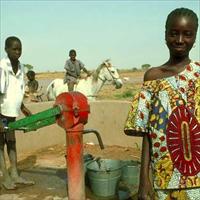ZAMBIA: Mining companies accused of environmental negligence

Zambia's mines are coming under increasing and sustained criticism for repeatedly polluting drinking water sources in the Copperbelt mining region, the country's economic heartland.
Last week the country's second largest copper producer, Mopani Copper Mine, which has mining operations in Mufulira town, near the border of the Democratic Republic of Congo, accidentally discharged polluted water, after a pump malfunction failed to purify it, into the reticulated water system of a private water utility company.
Nearly 1,000 residents visited local clinics, complaining of abdominal pains, severe diarrhoea and vomiting. No fatalities were recorded, but the widespread poisoning prompted residents to take to the streets in protest and police were called in to calm the demonstrators.
Although Mopani Copper Mine - owned jointly by Canada's First Quantum Minerals, Swiss firm Glencore International and the Zambian government, through ZCCM Investments Holdings - cited the failure to purify the water as an accident, others have accused the company of negligence.
"This is an act of total disregard for the rights of the people and the law of the land; it seems to suggest that the rights of the people are dispensable, while investment is indispensable. People are now living in fear because of the negligence of our mining companies, which shouldn't be the case," said Bob Sichinga, a former parliamentarian who once served on the parliamentary mining committee.
"The failure of the [mining] company's underground pump to purify the acidic water should have been avoidable by simply ensuring there was a standby alternative at all times. But even after it happened, the water utility should have been able to detect the impurities in the water - it didn't have to take the people to complain for the two companies to realise the pumped water was polluted," he told IRIN.
Use of pit water
Fredah Kabwe, one of about 200,000 Mufulira residents, said since the "accident" people had been resorting to collecting drinking water from shallow pit wells and watercourses. "We are all afraid of drinking piped water, but we are still using it for washing clothes and cleaning plates," Kabwe told IRIN.
"We are begging from our friends who have boreholes whenever we want do draw water for drinking. It will take us a long time to start using water from the taps because we know it is still unsafe, no matter what they tell us."
Record copper prices of nearly US$8,000 per tonne on the international market have triggered huge investment in Zambia's copper mines over the last three years, but critics have said most investors are putting profit above environmental safety.
In 2007, Zambia's biggest mining company, Konkola Copper Mine [KCM], owned by London-listed Vedanta Resources, caused widespread water pollution when its acidic effluent entered the Kafue River, the main source of water of about 2 million people in the area.
Hundreds of people fell sick after eating fish poisoned by the polluted water and more than 50 local farmers have taken legal action demanding compensation from the mining company because their crops withered and died after being irrigated with water from the river.
Under Zambian law, environmental management is a vital component of mining and all mining firms are obliged to prepare detailed environmental impact assessments, indicating how they will mitigate environmental problems such as air and water pollution. Erring companies face prosecution, fines or the withdrawal of their operating licenses.
KCM had its operating licence suspended for 10 days after the water pollution episode in 2007, and was instructed to install new environmental safety measures. The company reportedly lost $26 million during the suspension period.
"We are deeply concerned at the manner in which our mining companies are violating environmental laws. Our laws are sufficient but implementation is the biggest problem," said Edward Zulu, head of the government's environmental watchdog, the Environmental Council of Zambia.
"Every time an accident happens it is a question of people being negligent, or the machines being manned by unqualified people. We will now be forcing all mining companies to follow the law to the letter, and the penalties might include closures of some erring mines as a deterrent to other would-be offenders."
Economic impact
Analysts said such actions as closing mines could be counter-productive to the country's development. Mining contributes up to 80 percent of Zambia's foreign exchange, although government only charges a 0.6 percent in mineral royalties - the global norm is 3 percent.
Frederick Bantubonse, director of the Zambia Chamber of Mines, commented: "Inasmuch as we don't condone the pollution of the waters, closing a mine, even for a single day, would not be any good for the country's development. We should just work at ensuring such accidents are minimised, because they are accidents, and no one plans or wishes for an accident to occur."
He acknowledged that "The issue of polluting the water is very critical and we need to play a role in fighting it. We are finding it extremely difficult to tackle such problems because of lack of funds."
In 2006, according to a survey published by the Blacksmith Institute, a New York-based organisation monitoring pollution in the developing world, Kabwe, about 150km north of the capital, Lusaka, and home to 300,000 people, is Africa's most polluted city. It also has the dubious distinction of being ranked as the world's fourth most polluted site.
 Back and Next - Back and Next
Back and Next - Back and Next See Also - See Also
See Also - See Also